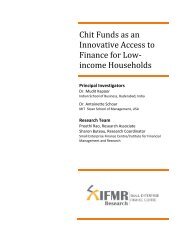Government of India Volume I: Analysis and Recommendations
Government of India Volume I: Analysis and Recommendations
Government of India Volume I: Analysis and Recommendations
You also want an ePaper? Increase the reach of your titles
YUMPU automatically turns print PDFs into web optimized ePapers that Google loves.
CAPITAL CONTROLS<br />
Table <strong>of</strong> <strong>Recommendations</strong> 8.2 Rule <strong>and</strong> regulation making process<br />
While making rules on inbound flows, the Central <strong>Government</strong> must first consult the RBI <strong>and</strong> then publish draft rules.<br />
The draft rules must be released for public consultation along with an analysis <strong>of</strong> the costs <strong>and</strong> benefits <strong>of</strong> the proposed<br />
rule. All other provisions <strong>of</strong> regulatory governance which apply to regulators while making draft regulations<br />
will apply to the Central <strong>Government</strong> as well.<br />
For outbound flows, the RBI must first consult the Central <strong>Government</strong> <strong>and</strong> then utilise the usual regulation-making<br />
process.<br />
In emergency circumstances, the Central <strong>Government</strong> or the RBI, as the case may be, need not follow the detailed rule<br />
making process. However, consultation between the Central <strong>Government</strong> <strong>and</strong> the RBI must precede the rule making.<br />
Additional controls on capital account transactions may be imposed in emergency circumstances.<br />
The emergency rules <strong>and</strong> regulations will remain valid for only three months, <strong>and</strong> are required to be notified <strong>and</strong><br />
placed before both the Houses <strong>of</strong> the Parliament.<br />
The emergency rules <strong>and</strong> regulations will remain valid for only three months, <strong>and</strong> are required to be notified <strong>and</strong><br />
placed before both the Houses <strong>of</strong> the Parliament.<br />
Emergency situations include:<br />
1. Outbreak <strong>of</strong> a natural calamity;<br />
2. Grave <strong>and</strong> sudden changes in domestic <strong>and</strong> foreign economic conditions;<br />
3. Serious difficulties or expectation <strong>of</strong> serious difficulties in international payments <strong>and</strong> international finance;<br />
4. Proclamation <strong>of</strong> national emergency under Article 352 <strong>of</strong> the Constitution <strong>of</strong> <strong>India</strong>; or<br />
5. Proclamation <strong>of</strong> financial emergency under Article 360 <strong>of</strong> the Constitution <strong>of</strong> <strong>India</strong>.<br />
Table <strong>of</strong> <strong>Recommendations</strong> 8.3 Grant <strong>of</strong> approval<br />
The Central <strong>Government</strong>, in relation to inbound flows, <strong>and</strong> the RBI, in relation to outbound flows, will have the authority<br />
to grant approvals or dispose <strong>of</strong>f applications by following a time-bound due process. Reasoned decision in this<br />
regard must be provided. If approval is granted, it must clearly specify the scope, effective period <strong>and</strong> any conditions<br />
subject to which it is granted.<br />
While deciding on an application, the principles <strong>of</strong> proportionality between the costs imposed <strong>and</strong> the benefits expected<br />
to be achieved must be considered, <strong>and</strong> similarly situated persons must be treated in a similar manner i.e.<br />
full national treatment must be followed.<br />
However, the Central <strong>Government</strong> <strong>and</strong> the RBI may impose conditions or reject applications on national security<br />
considerations such as:<br />
1. Ownership <strong>of</strong> critical infrastructure by foreign investors;<br />
2. Ownership <strong>of</strong> critical technologies by foreign investors;<br />
3. Control or ownership <strong>of</strong> assets in <strong>India</strong> by foreign governments;<br />
4. Involvement <strong>of</strong> a non-resident or foreign government which presents a threat to peaceful coexistence <strong>of</strong> <strong>India</strong><br />
with other nations;<br />
5. Involvement <strong>of</strong> a non-resident or foreign government which presents a threat or a major disruption to foreign<br />
relations <strong>of</strong> <strong>India</strong>; or<br />
6. Any other matter prescribed by the Central <strong>Government</strong> or specified by the RBI.<br />
provide decisions within specific <strong>and</strong> reasonable time limits. However, the Central <strong>Government</strong><br />
<strong>and</strong> RBI may deny approvals or impose conditions where there are national security<br />
considerations.<br />
Table 8.3 establishes the Commission’s recommended framework regarding the granting<br />
<strong>of</strong> approvals that is embedded in the draft Code.<br />
8.3.4. Review<br />
The decisions <strong>of</strong> the Central <strong>Government</strong> <strong>and</strong> the RBI will be subject to a two-tier review.<br />
A senior <strong>of</strong>ficer in the Central <strong>Government</strong> will hear the matters relating to denial <strong>of</strong> approvals<br />
or imposition <strong>of</strong> unnecessary conditions by the Central <strong>Government</strong>. Appeals<br />
from orders <strong>of</strong> such senior <strong>of</strong>ficers would lie to the appellate tribunal. The administrative<br />
FINANCIAL SECTOR LEGISLATIVE REFORMS COMMISSION 85



